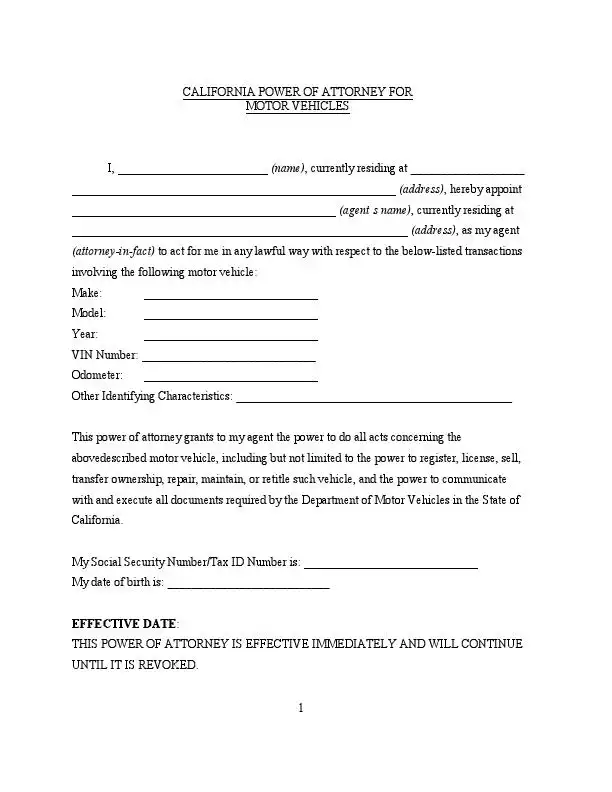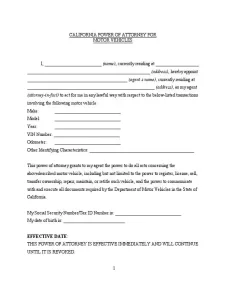California Motor Vehicle Power of Attorney Form
The California motor vehicle power of attorney, also known as Form REG 260, allows an individual to appoint a representative to handle responsibilities related to the ownership and operation of a motor vehicle. This form helps delegate authority to make decisions or perform tasks such as title registration, vehicle transactions, and interactions with the California Department of Motor Vehicles (DMV).

Build Your Document
Answer a few simple questions to make your document in minutes
Save and Print
Save progress and finish on any device, download and print anytime
Sign and Use
Your valid, lawyer-approved document is ready
To ensure the legal standing of a power of attorney, it must comply with specific requirements set forth under California law. These requirements are detailed in the California Probate Code, which governs the use and limitations of California POA forms.
Section 4121 outlines the legal requirements for executing the power of attorney document, including the necessity for the principal’s signature and either witness signatures or a notary acknowledgment. Section 4128 provides a statutory form that defines what information must be included to create a legally valid power of attorney.
For the motor vehicle power of attorney to be considered valid and enforceable, the following components must be included:
- The full legal name, California address, and contact information of the principal (the person granting the power).
- The full legal name, address, and contact information of the agent (the person receiving the power).
- Specific details regarding the powers granted to the agent, such as the authority to sign documents related to the vehicle’s sale, purchase, or registration.
- The principal’s signature must be either notarized or witnessed by two adults who are not parties to the document.
The form must be filled out completely and accurately to avoid any legal issues or delays in the transactions for which the power of attorney is intended. Moreover, it’s advisable for both the principal and the agent to keep copies of the completed form for their records and potential future verification.
California Motor Vehicle Power of Attorney Form Details
| Document Name | California Motor Vehicle Power of Attorney Form |
| State Form Name | Form REG 260 |
| Relevant Link | California Department of Motor Vehicles |
| Avg. Time to Fill Out | 10 minutes |
| # of Fillable Fields | 32 |
| Available Formats | Adobe PDF |
Filling Out California Vehicle POA
Following these steps carefully, you can properly complete California Form REG 260, ensuring it is legally valid and enforceable. This document will enable your appointed representative to manage your motor vehicle-related responsibilities.
1. Vehicle/Vessel Description
Begin by entering the details of the vehicle or vessel. This part includes the identification number, year, model, make, license plate/CF number, and motorcycle engine number (if applicable). Accurate and complete information is essential for the form’s validity.
2. Enter the Principal’s Information
Enter the principal’s full legal name (the person granting the power). Include your current address and contact information. This ensures that correspondence or legal notices can be sent to the correct location.
3. Designate the Attorney-in-Fact
Enter the name of the person you designate as your agent. This person will have the authority to act on your behalf regarding your vehicle. You must trust this person to make decisions regarding your vehicle.
4. Signatures
Both the principal and the appointed attorney-in-fact must sign the form. Each signature must be in ink. Below the signature line for the person appointing a power of attorney, fill in the city, state, zip code, date, driver’s license (DL), ID, or dealer number. This information must be accurate to prevent any legal issues.
5. Certification
The form includes a certification statement under penalty of perjury. By signing this form, you declare that all information provided is true and correct under the laws of the State of California. Ensure that you fully understand this declaration before signing.
6. Final Review and Copies
Review all sections to ensure accuracy once the form is completed and signed. The principal and the attorney-in-fact should keep copies of the signed form for their records.
